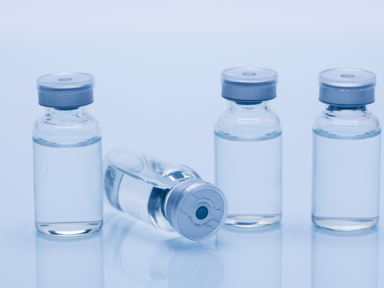worldpharmanewsJune 21, 2021
Tag: CureVac , CVnCoV , COVID-19 Vaccine
CureVac N.V., a clinical-stage biopharmaceutical company developing a new class of transformative medicines based on messenger ribonucleic acid ("mRNA"), announced results of the second interim analysis of its international pivotal Phase 2b/3 study in approximatively 40,000 subjects (the HERALD study) of CureVac's first-generation COVID-19 vaccine candidate, CVnCoV. In the unprecedented context of at least 13 variants circulating within the study population subset assessed at this interim analysis, CVnCoV demonstrated an interim vaccine efficacy of 47% against COVID-19 disease of any severity and did not meet prespecified statistical success criteria. Initial analyses suggest age and strain dependent efficacy. Available data were communicated with the European Medicines Agency (EMA). The Data Safety Monitoring Board (DSMB) confirmed a favorable safety profile for CVnCoV. The study is continuing to the final analysis and the totality of the data will be assessed for the most appropriate regulatory pathway.

In total, 134 Covid-19 cases were assessed in this interim analysis. Out of these cases, 124 were sequenced to identify the variant causing the infection. The outcome confirms that only one single case was attributable to the original SARS-CoV-2 virus. More than half of the cases (57%) were caused by Variants of Concern. Most of the remaining cases were caused by other less characterised variants such as Lambda or C.37, first identified in Peru (21%) and B.1.621, first identified in Colombia (7%). In this context, the interim results suggest efficacy in younger participants but did not allow to conclude on efficacy in the age group above 60.
"While we were hoping for a stronger interim outcome, we recognize that demonstrating high efficacy in this unprecedented broad diversity of variants is challenging. As we are continuing toward the final analysis with a minimum of 80 additional cases, the overall vaccine efficacy may change," said Dr. Franz-Werner Haas, Chief Executive Officer of CureVac. "In addition, the variant-rich environment underlines the importance of developing next-generation vaccines as new virus variants continue to emerge."
The HERALD study, conducted by Curevac in conjunction with Bayer, enrolled approximately 40,000 participants in ten countries in Latin America and Europe. The second interim analysis included 134 cases, occurring at least two weeks after administration of the second dose. To identify strains causing COVID-19 infections within the trial, sequencing of virus variants has so far been performed on 474 COVID-19 cases, of which 124 fulfilled adjudication criteria and were included in the present efficacy analysis.
CureVac remains committed to COVID-19 vaccine development. Beyond CVnCoV, the company develops in partnership with GSK second-generation COVID-19 vaccine candidates. These candidates are based on new mRNA backbones and include potential variants in multivalent vaccine formats as well as combination vaccines for potential protection against multiple infectious diseases in one vaccine. Preclinical data from the first vaccine candidate, CV2CoV, has recently been accepted for publication in Nature Communications. CureVac and GSK expect to progress the second-generation vaccine candidate into clinical testing in the third quarter of 2021, with the goal of introducing the vaccine in 2022, subject to regulatory approval.
CureVac began development of mRNA-based COVID-19 vaccine candidates in January 2020. The vaccine candidate chosen for first clinical development, CVnCoV, is an optimized, non-chemically modified mRNA, encoding the prefusion stabilized full-length spike protein of the SARS-CoV-2 virus, and formulated within Lipid Nanoparticles (LNPs). Phase 1 and 2a clinical trials of CVnCoV began in June and September 2020, respectively. Phase 1 interim data reported in November 2020 showed that CVnCoV was generally well tolerated across all tested doses and induced strong antibody responses in addition to first indication of T cell activation. The quality of the immune response was comparable to recovered COVID-19 patients, closely mimicking the immune response after natural COVID-19 infection. A pivotal Phase 2b/3, the HERALD study, with a 12µg dose of CVnCoV was initiated in December 2020. In February 2021, CureVac initiated a rolling submission with the European Medicines Agency (EMA) for CVnCoV.
CureVac is a global biopharmaceutical company in the field of messenger RNA (mRNA) technology, with more than 20 years of expertise in developing and optimizing the versatile biological molecule for medical purposes. The principle of CureVac’s proprietary technology is the use of non-chemically modified mRNA as a data carrier to instruct the human body to produce its own proteins capable of fighting a broad range of diseases. Based on its proprietary technology, the Company has built a deep clinical pipeline across the areas of prophylactic vaccines, cancer therapies, antibody therapies, and the treatment of rare diseases. CureVac had its initial public offering on the New York Nasdaq in August 2020. It is headquartered in Tübingen, Germany, and employs more than 700 people at its sites in Tübingen, Frankfurt, and Boston, USA.


Contact Us
Tel: (+86) 400 610 1188
WhatsApp/Telegram/Wechat: +86 13621645194
Follow Us:




 Pharma Sources Insight January 2025
Pharma Sources Insight January 2025


